Today, we are commemorating the third year of the horrid Brussels attacks where 32 victims were killed and hundreds were injured. Their memories are still vivid in our minds and hearts as are the memories of other victims of terrorism spanning Europe, the Middle East, Africa, North America, Asia and the Pacific.
The increasing threat of terrorist attacks led to a change of seas in the fight against terrorism in Europe. An ambitious approach to create a Security Union was embraced, while justice and home affairs became a top priority for EU policy making. Recently adopted security measures include ensuring interoperability of EU member state databases and intelligence sharing, tightening controls regarding the movement of people and reinforcing Frontex. In addition, Europol’s European Counter Terrorism Centre, the European Border and Coast Guard Agency and the Radicalisation Awareness Network Centre of Excellence were established.
Moreover, travelling or facilitating travels outside or to the EU for terrorist purposes, collecting funds to be used for terrorist activities, receiving and carrying out terrorist training were criminalised while cross-border cooperation against money laundering was improved to curb access to terrorist financing.
The internal-external nexus was given more importance, especially taking into account some 5000 foreign fighters who are returning from Syria and Iraq, especially following the defeat of ISIS. In this context, counter-terrorism cooperation was strengthened with the EU’s neighbours in Western Balkans, Turkey and North Africa, especially through the appointment of counter-terrorism experts.
However, a lot of challenges remain unaddressed. While thousands of foreign fighters are in the custody of the US-backed Syrian Defence Forces in Syria, their fate becomes unclear with the planned US withdrawal from the country. While organised repatriation would be necessary, especially for women and children, the creation of an international tribunal for the trial of ISIS fighters may be considered together with increased efforts to collect legal evidence in the battlefield to support their prosecution. The radicalisation process in prisons is yet another issue that needs to be tackled, for example, by capacity building, training of prison staff, and greater cooperation between prison and probation services.
A conference on the fight against terrorism organised by the European Foundation for Democracy and the European Policy Centre this week highlighted that hard security measures would not be sufficient to overcome the problem of radicalisation, stressing the need to involve grassroot organisations and frontline practitioners to help strengthening the resilience of vulnerable communities.
The role of radical ideologies - be it right-wing, left-wing, Islamist or other - as main drivers of radicalisation was also acknowledged while calling for increased resources to radicalisation prevention efforts. Particular focus should be directed towards non-violent groups whose rhetoric could lead to violent acts, with the empowerment of more vetted civil society groups and the elaboration of counter-narratives by role models.
According to the European Commissioner for Migration, Home Affairs and Citizenship, the instrumentalisation of online platforms by terrorist groups to spread radical ideas should not be underestimated. Although some legislation was put in place to restrict the hosting of terrorist content, the quickly disseminated live stream of the recent New Zealand attacks demonstrated once again the necessity to develop further measures enabling the removal of terrorist content within an hour. These measures are expected to be adopted by the EU co-legislators before the European elections.
Of course, there is no quick fix against radicalisation and terrorism and all of the actors, including, teachers, parents, social partners, civil society, psychologists, should work hand in hand with the authorities to grapple with these challenges in a holistic way. Last but not least, politicians and media have to act responsibly by refraining from extreme views and divisive language, which could further polarise our societies and stigmatise certain communities.
By Eli Hadzhieva

